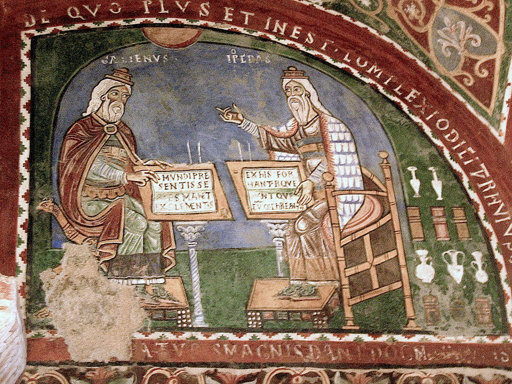1.4 What is health? Ancient answers
What would people in the ancient world consider when thinking about whether they were healthy or not? As it is now, health was a matter of everyday conversation and, like us, the ancient Greeks would drink to each other’s health. Furthermore, Roman letters often began with ‘I hope you are well’ or ended with ‘Take care of your health, as best you can’.
Here is Celsus, a first century CE Roman, writing about the distant past in the introduction to his On Medicine, part of an otherwise lost encyclopaedia:
It is probable that with no aids against bad health, none the less health was generally good because of good habits, which neither indolence nor luxury had vitiated: since it is these two which have afflicted the bodies of men, first in Greece, and later amongst us; and hence this complex Art of Medicine, not needed in former times, nor among other nations even now, scarcely protracts the lives of a few of us to the verge of old age.
In other words, health in the past must have been good because lifestyles were better, and this is still the opinion of many.
Scholars disagree about whether Celsus was a doctor or a wealthy amateur but, as the head of a Roman household, he would in any case have been responsible for the health of his own family, slaves and animals. The first book of his section on medicine opens with: ‘A man in health, who is both vigorous and his own master, should be under no obligatory rules, and have no need, either for a medical attendant [medicus], or for a rubber and anointer [iatrolipta].’(Celsus, On Medicine 1.1) This, Celsus explains, is because such a man should have enough variety in his life to have a balanced body.
Balance was a key concept in ancient health, whether this was in terms of the different constituents of the body, the relationship between food and activity, or between the body and its environment. Celsus said that a healthy person should move between town and country, and between exercise and rest, and will eat twice a day rather than once a day.
The ancient doctor Galen, the most famous of all ancient medical writers, because of the amount he wrote and its later influence, worked in the second century CE. He wrote:
I see all men using the nouns hygieia and nosos thus … For they consider the person in whom no activity of any part is impaired ‘to be healthy’, but someone in whom one of them is impaired ‘to be sick’.
Nosos is the ancient Greek word for ‘disease’. How far do you think Galen meant to go when writing ‘any part’? If the activity of a leg is to walk, then a person can’t be healthy if the leg can’t walk. If the activity of a womb is to develop a foetus, then an infertile woman can’t be healthy. But a leg is also used for balance; if you can stand up, but your walking is slightly impaired, are you then ‘healthy’? A womb’s functions include expelling blood from the body – women’s flesh was thought to be more spongy than that of men, absorbing more fluid from their diet and needing to lose it regularly to maintain health – so if a woman was menstruating but had never conceived, was she ‘healthy’? You will return to these questions later in the course.

